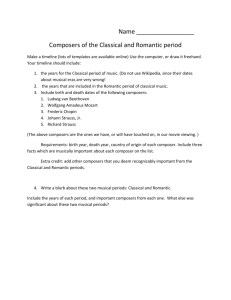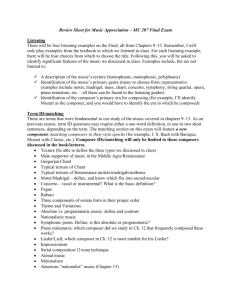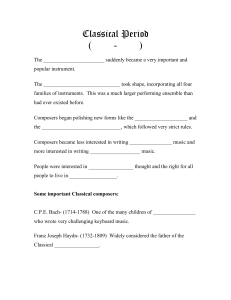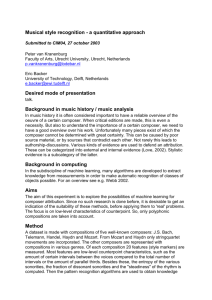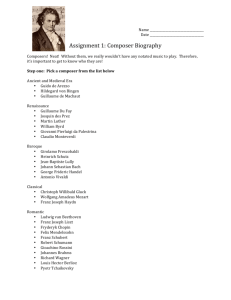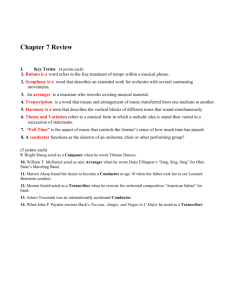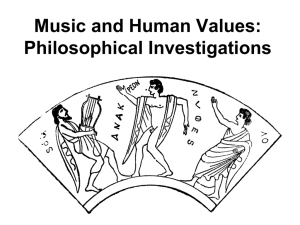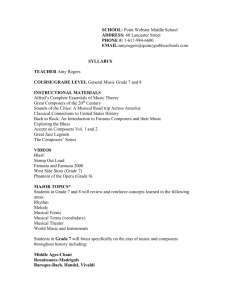File - Jamie Stucki
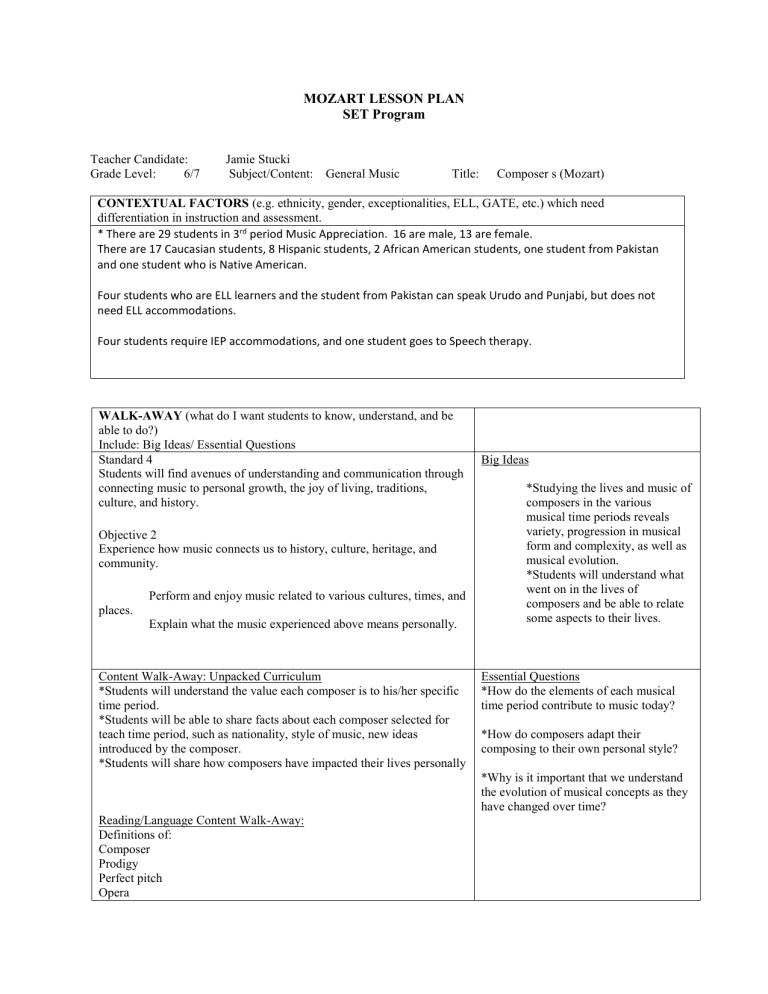
MOZART LESSON PLAN
SET Program
Teacher Candidate: Jamie Stucki
Grade Level: 6/7 Subject/Content: General Music Title: Composer s (Mozart)
CONTEXTUAL FACTORS (e.g. ethnicity, gender, exceptionalities, ELL, GATE, etc.) which need differentiation in instruction and assessment.
* There are 29 students in 3 rd period Music Appreciation. 16 are male, 13 are female.
There are 17 Caucasian students, 8 Hispanic students, 2 African American students, one student from Pakistan and one student who is Native American.
Four students who are ELL learners and the student from Pakistan can speak Urudo and Punjabi, but does not need ELL accommodations.
Four students require IEP accommodations, and one student goes to Speech therapy.
WALK-AWAY (what do I want students to know, understand, and be able to do?)
Include: Big Ideas/ Essential Questions
Standard 4
Students will find avenues of understanding and communication through connecting music to personal growth, the joy of living, traditions, culture, and history.
Objective 2
Experience how music connects us to history, culture, heritage, and community.
Perform and enjoy music related to various cultures, times, and places.
Explain what the music experienced above means personally.
Content Walk-Away: Unpacked Curriculum
*Students will understand the value each composer is to his/her specific time period.
*Students will be able to share facts about each composer selected for teach time period, such as nationality, style of music, new ideas introduced by the composer.
*Students will share how composers have impacted their lives personally
Reading/Language Content Walk-Away:
Definitions of:
Composer
Prodigy
Perfect pitch
Opera
Big Ideas
*Studying the lives and music of composers in the various musical time periods reveals variety, progression in musical form and complexity, as well as musical evolution.
*Students will understand what went on in the lives of composers and be able to relate some aspects to their lives.
Essential Questions
*How do the elements of each musical time period contribute to music today?
*How do composers adapt their composing to their own personal style?
*Why is it important that we understand the evolution of musical concepts as they have changed over time?
Pauper’s grave
ASSESSMENT EVIDENCE (formative/summative checks for learning)
(Match the Content Walk-Away)
Formative Evidence (checking for understanding throughout the lesson):
*Identify new musical ideas introduced by composers as the time periods move forward.
*Analyze listening examples of composers from each time period and listen for specific compositional ideas.
Content Walk-Away Evidence (Summative):
*Students will identify the different musical time periods based on compositional elements and instrumentation, as well as specific composers.
Language Walk-Away Evidence (Summative):
*Students will know the definition of composer, prodigy, perfect pitch, opera, and pauper’s grave
Modifications/Accommodations (ELL,
IEP, GATE, etc.)
* Partner up and ELL student with an EL speaker to help them find and understand vocabulary.
*There are many composers. I need to teach them in a variety of ways so that students don’t get bored.
*I will find composers specific to the country that a student is from and touch on that composer during the time period the composer is in.
ACTIVE LEARNING PLAN
Activate Prior Knowledge/Experiences
*Ask what students know about the Classical time period .
*Ask students to name composers that they know from the Classical time period.
Focus Lesson (“I do it”)
*Teach students about Mozart and his contributions to a the Classical time period
Guided Instruction (“We do it”)
*Play composer bingo using Mozart bingo cards and a Prezi presentation to learn about Mozart’s life and contributions to the Classical time period
Collaborative/Cooperative (“You do it together”)
*Play composer bingo and learn about a composer
*Make it fun by learning facts about Mozart that helps him be a real person-not just a stiff, boring composer from a long time ago. He had a pet grasshopper!
Independent (“You do it alone”)
Summarization/Closure
*Give students a post-test to assess what they’ve learned about this specific composer
Revisit Essential Questions
*How did the elements of Mozart’s music of the classical time period contribute to music today?
*How did Mozart adapt his composing to this own personal style?
*Why is it important that we understand the evolution of musical concepts as they have changed over time?
Modifications/
Accommodations
(ELL, IEP, GATE, etc.)
*Check for clarity and understanding by asking students if they are understanding the concepts we are talking about
*
NOTES TO TEACHER
What do I need to remember to do?
Print Bingo boards
Have informational sheet ready
Create Prezi with vocabulary words, photos and musical examples for each bingo square
Materials to have ready?
Bingo boards (enough all classes)
Pencils
Approximate time needed for lesson?
40 minutes
REFLECTION AFTER LESSON
How can I use the assessment data to reflect on & evaluate the outcomes of teaching and learning? How can I transfer what I learned from teaching this lesson to future teaching? What was effective and not effective? What goals can I set to improve my practice and student learning?
I absolutely loved teaching this lesson plan! It was so satisfying to see the huge increase of knowledge from the pre-test to the post-test! I did a variety of question formats in the assessments, and I have come to realize that I needed to clarify how to answer certain questions.
During the actual lesson the students were engaged in the sharing of the information of the lesson. The use of the prezi technology was fun to create and use, and I will definitely use prezi in future lessons. I did have a “technical difficulty” in one class, which caused me to realize that I need to trouble shoot beforehand.
I feel that everything I taught in this lesson was effective. Through watching the video of my teaching, I realize that I may need to pull my hair out of my face so that I don’t have to mess with it so much, but that has nothing to do with my teaching strategies.
Goals that I could set to improve my practice and student learning would include being more prepared with technology, and explain questions on pre-test/post-test more efficiently.
